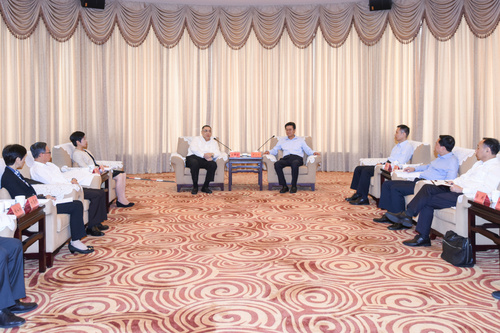 Chief Executive, Mr Chui Sai On, meets with the Secretary of CPC Zhuhai Municipal Committee, Mr Guo Yonghang, during his visit in Zhuhai.
Chief Executive, Mr Chui Sai On, meets with the Secretary of CPC Zhuhai Municipal Committee, Mr Guo Yonghang, during his visit in Zhuhai.
The Chief Executive, Mr Chui Sai On, visited Zhuhai, Guangzhou and Shenzhen in the period of 21 June to 22 June, and met with the officials of those cities. There was general agreement on enhancing cooperation, something considered beneficial to promoting Macao’s adequate economic diversification and sustainable development.
A Macao Special Administrative Region (SAR) Government delegation led by Mr Chui began its visit to three cities of the Guangdong-Hong Kong-Macao Greater Bay Area (“Greater Bay Area”) on 21 June. Its first and second stops were at, respectively, the Macau-Hengqin Youth Entrepreneurship Valley and the Guangdong-Macao Traditional Chinese Medicine Science and Technology Industrial Park, both located in Hengqin New Area, Zhuhai. The delegation held discussions with Macao enterprises that have established offices in Hengqin.
At a seminar, Mr Chui listened to presentations by representatives of five Macao enterprises operating businesses in Hengqin. Mr Chui said he took a close interest in the development and needs of Macao enterprises with offices in Hengqin, and the Macao and Zhuhai governments would jointly consider policies and measures to help them develop.
Immediately after the seminar, Mr Chui met with the Secretary of the Communist Party of China (CPC) Zhuhai Municipal Committee, Mr Guo Yonghang. Mr Chui said the Macao SAR attached great importance to cooperation with Zhuhai, and looked forward to pursuing joint efforts with Zhuhai after the launch of the Greater Bay Area development plan. The aim was to reach a new level of cooperation and development that was beneficial to Macao’s adequate economic diversification and sustainable development.
Mr Chui suggested that, under the framework of the Greater Bay Area development plan, Zhuhai and Macao could enhance cooperation and achieve breakthroughs in development of specialised financial businesses, “smart city” building, and growth in the role of the Traditional Chinese Medicine Science and Technology Industrial Park. Both sides should join efforts to seek the Central People’s Government’s support to further include Macao as part of the national development strategy, and broaden the scope of cooperation. Mr Chui said he believed that supporting cross-boundary movement of talented people would in turn facilitate flows of capital, materials and information, which would be advantageous to Macao’s adequate economic diversification.
Mr Guo said that Macao’s support and assistance were critical to the development of Zhuhai. It was also the responsibility of Zhuhai and Hengqin to support the diversification of Macao’s industries, and foster the long-term prosperity and stability of Hong Kong and Macao. As Macao and Zhuhai were mutually-dependent neighbours, the Hengqin Free Trade Zone in particular should provide more services to Macao. Macao also had a role in facilitating the development of Hengqin. Despite its limited economic diversity currently, Macao enjoyed a favourable environment for developing policies and culture, he noted.
The Macao SAR Government delegation arrived in Guangzhou during the afternoon of 21 June, and paid visits to an artificial intelligence technology enterprise and an urban development firm, to gain a better understanding of the most recent industrial trends in Guangzhou. Mr Chui’s first stop in the city was at iFlytek South China Co. Ltd, where he was briefed by company representatives regarding ways its technology helped to foster the development of artificial intelligence technology in the Great Bay Area.
Mr Chui and the Secretary for Administration and Justice, Ms Chan Hoi Fan, who was also a member of the Macao delegation, were particularly interested in a translation system developed by the company, especially the quality of its Portuguese translation function. They tested the artificial intelligence translation system with Cantonese and Portuguese, respectively.
After the visit, Mr Chui met with the Secretary of the CPC Guangzhou Municipal Government, Mr Ren Xuefeng. Mr Chui said he hoped Macao would enhance cooperation with Guangzhou based on the existing foundation and cooperation relationship, and in particular would develop such ties in accordance with the direction set out in the Greater Bay Area development plan, once it was released.
Mr Chui expressed his thoughts regarding Macao’s adequate economic diversification. As Macao’s economy was relatively less diverse than that of some of its neighbours, in terms of the range of its industries, he hoped to receive support from Guangzhou and to promote technological development through regional cooperation. He especially hoped to work with neighbouring provinces and municipalities, including learning from Guangzhou's achievements.
Macao was eager to cooperate with Guangzhou in the areas of education, culture, tourism, economy and trade, technology, youth entrepreneurship and innovation, and especially in enhancing exchanges between young people, which would help Macao’s development.
Mr Ren said the Greater Bay Area development plan would soon be released. Guangzhou would be actively participating in the initiative and would seek greater levels of exchange and practical cooperation with Macao. He encouraged Macao’s young people to pay frequent visits to Guangzhou to seize more of the opportunities for cooperation.
The delegation led by Mr Chui arrived in Shenzhen the following day (22 June). While there, it visited the Shenzhen Stock Exchange and the Ping An Insurance (Group) Company of China Ltd, to gain a better understanding of the latest developments in Shenzhen's financial and innovative technology industries, and to explore ways of assisting Macao with developing its own specialised financial services and “smart city” infrastructure.
Mr Chui then met with the Mayor of Shenzhen, Mr Chen Rugui. Mr Chui said that Macao and Shenzhen had established a solid foundation for exchanges in tourism, culture, trade, finance and service industries. He looked forward to deeper and more concrete cooperation with Shenzhen after the launch of the Greater Bay Area development plan.
Mr Chen said he realised that the Greater Bay Area development plan would be a golden opportunity. Shenzhen and Macao should seize it, in order to create a favourable living and working environment, and to promote greater practical cooperation. Regarding the financial services industry, Mr Chen said that Shenzhen enjoyed a solid foundation and development potential, and hoped to explore more opportunities for cooperation with Macao in innovation and technology funds, cooperative banking and insurance businesses.
He said that, with the leadership and support of the Central People’s Government, Shenzhen was eager to make use of its financial strength in order to foster Macao’s economic diversification. Mr Chen said it was important to seize opportunities for cooperation and establish a close relationship.


